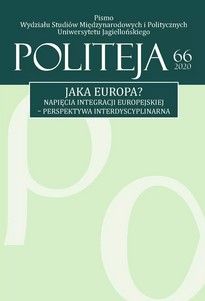Znaczenie eurosceptycyzmu na scenie politycznej Republiki Czeskiej. Uwarunkowania i konsekwencje
The importance of euroscepticism on the political scene of the Czech Republic. Conditions and consequences
Author(s): Krzysztof KoźbiałSubject(s): Government/Political systems, Political behavior, Politics and society, Comparative politics, EU-Approach / EU-Accession / EU-Development
Published by: KSIĘGARNIA AKADEMICKA Sp. z o.o.
Keywords: Euroscepticism; Czech Republic; political system of the Czech Republic; Vaclav Klaus; Czexit; Czech Republic in the EU;
Summary/Abstract: Czech society is one of the most eurosceptic in the European Union. One of the reasons is a low degree of trust in authority (government, parliament) in general, also at the supranational level. Consequently, Czech political parties have eurosceptic slogans in their programs that do not prevent voters from supporting them, both in the elections to the Czech and European Parliaments. The political system is dominated by parties presenting the so‑ called „soft euroscepticism” (according to Taggart’s and Szczerbiak’s approach), such as: Action of Dissatisfied Citizens (ANO 2011), Civic Democratic Party (ODS) or Communist Party of Bohemia and Moravia (KSČM). In the 2017 election, they received a total of almost 50% of the vote. However, euroscepticism is not a threat to the Czech presence in the EU. Extremely eurosceptic parties do not enjoy great public support.
Journal: Politeja - Pismo Wydziału Studiów Międzynarodowych i Politycznych Uniwersytetu Jagiellońskiego
- Issue Year: 17/2020
- Issue No: 66
- Page Range: 261-276
- Page Count: 16
- Language: Polish

